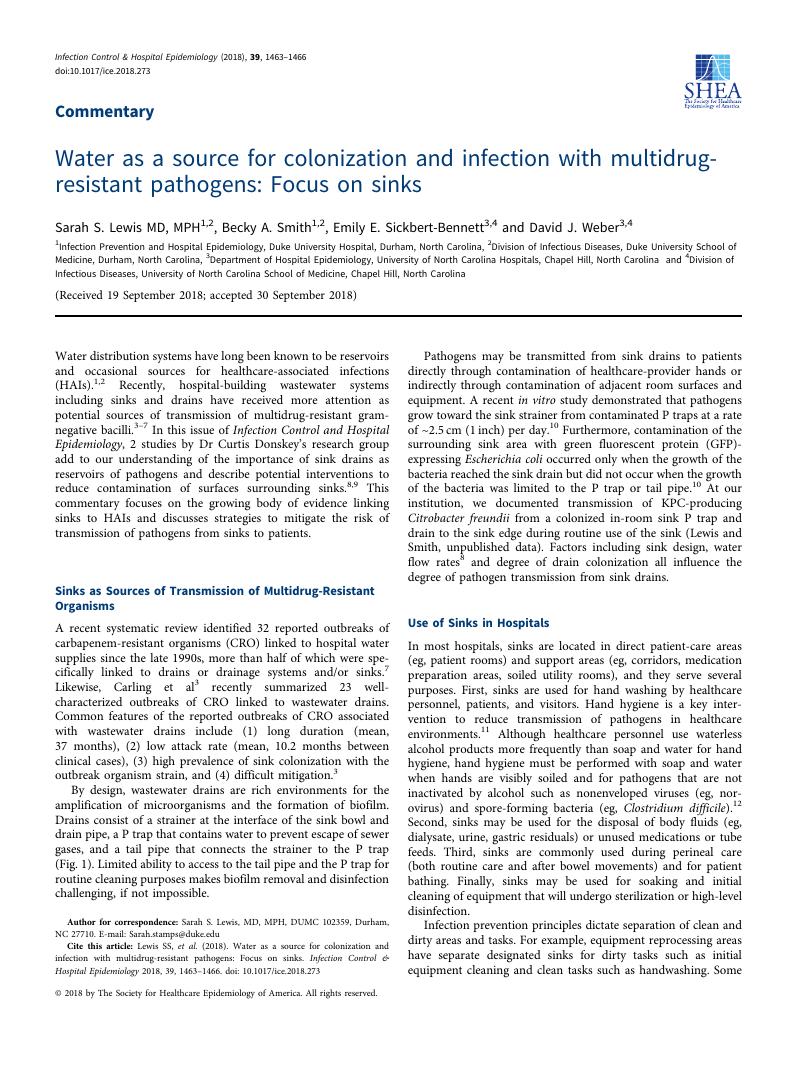Crossref Citations
This article has been cited by the following publications. This list is generated based on data provided by Crossref.
Weber, David J.
Sickbert-Bennett, Emily E.
Kanamori, Hajime
and
Rutala, William A.
2019.
New and emerging infectious diseases (Ebola, Middle Eastern respiratory syndrome coronavirus, carbapenem-resistant Enterobacteriaceae, Candida auris): Focus on environmental survival and germicide susceptibility.
American Journal of Infection Control,
Vol. 47,
Issue. ,
p.
A29.
Qiao, Fu
Wei, Li
Feng, Yu
Ran, Shasha
Zheng, Lan
Zhang, Yujing
Xiang, Qian
Liu, Yan
Wu, Xueqin
Duan, Xiaofei
Zhang, Wensheng
Li, Qu
Guo, Hua
Huang, Wenzhi
Zhu, Shichao
Wen, Hongxia
and
Zong, Zhiyong
2020.
Handwashing Sink Contamination and Carbapenem-resistant Klebsiella Infection in the Intensive Care Unit: A Prospective Multicenter Study.
Clinical Infectious Diseases,
Vol. 71,
Issue. Supplement_4,
p.
S379.
Jones, Lucas D.
Mana, Thriveen S.C.
Cadnum, Jennifer L.
Jencson, Annette L.
Silva, Sandra Y.
Wilson, Brigid M.
and
Donskey, Curtis J.
2020.
Effectiveness of foam disinfectants in reducing sink-drain gram-negative bacterial colonization.
Infection Control & Hospital Epidemiology,
Vol. 41,
Issue. 3,
p.
280.
Feng, Y.
Wei, L.
Zhu, S.
Qiao, F.
Zhang, X.
Kang, Y.
Cai, L.
Kang, M.
McNally, A.
and
Zong, Z.
2020.
Handwashing sinks as the source of transmission of ST16 carbapenem-resistant Klebsiella pneumoniae, an international high-risk clone, in an intensive care unit.
Journal of Hospital Infection,
Vol. 104,
Issue. 4,
p.
492.
Catho, Gaud
Martischang, R.
Boroli, F.
Chraïti, M. N.
Martin, Y.
Koyluk Tomsuk, Z.
Renzi, G.
Schrenzel, J.
Pugin, J.
Nordmann, P.
Blanc, D. S.
and
Harbarth, S.
2021.
Outbreak of Pseudomonas aeruginosa producing VIM carbapenemase in an intensive care unit and its termination by implementation of waterless patient care.
Critical Care,
Vol. 25,
Issue. 1,
Schulz-Stübner, Sebastian
Fritz, Eva
Schürle, Holger
Riechelmann, Janine
and
Tuschewitzki, Georg-Joachim
2021.
The role of the faucet's aerator kit for contamination of drinking water.
American Journal of Infection Control,
Vol. 49,
Issue. 5,
p.
643.
Cho, Jung-Ah
Roh, Yoo Jin
Son, Hye Rim
Choi, Hojung
Lee, Jeong-Won
Kim, Sung Jae
and
Lee, Chang-Hun
2022.
Assessment of the biofilm-forming ability on solid surfaces of periprosthetic infection-associated pathogens.
Scientific Reports,
Vol. 12,
Issue. 1,
Schneider, Julia S.
Froböse, Neele J.
Kuczius, Thorsten
Schwierzeck, Vera
and
Kampmeier, Stefanie
2023.
Sink Drains in a Neonatal Intensive Care Unit: A Retrospective Risk Assessment and Evaluation.
International Journal of Environmental Research and Public Health,
Vol. 20,
Issue. 17,
p.
6692.
Pople, Diane
Kypraios, Theodore
Donker, Tjibbe
Stoesser, Nicole
Seale, Anna C.
George, Ryan
Dodgson, Andrew
Freeman, Rachel
Hope, Russell
Walker, Ann Sarah
Hopkins, Susan
and
Robotham, Julie
2023.
Model-based evaluation of admission screening strategies for the detection and control of carbapenemase-producing Enterobacterales in the English hospital setting.
BMC Medicine,
Vol. 21,
Issue. 1,
Jung, Jiwon
2024.
Management of Sink in the Healthcare Facility to Prevent the Spread of Gram-negative Organisms.
Korean Journal of Healthcare-Associated Infection Control and Prevention,
Vol. 29,
Issue. 2,
p.
103.
Shikama, Yoshiaki
Yokoya, Chiemi
Ohara, Akira
Yamashita, Megumi
Shimizu, Yuichi
and
Imagawa, Tomoyuki
2024.
Carbapenemase-producing Enterobacterales isolated from hospital sinks: molecular relationships with isolates from patients and the change in contamination status after daily disinfection with sodium hypochlorite.
Antimicrobial Stewardship & Healthcare Epidemiology,
Vol. 4,
Issue. 1,
Moulin, Estelle
Filippidis, Paraskevas
Paire-Ficout, Corinne Aymon
Blanc, Dominique S.
Grandbastien, Bruno
and
Senn, Laurence
2024.
Successful control of an environmental reservoir of NDM-producing Klebsiella pneumoniae associated with nosocomial transmissions in a low-incidence setting.
Antimicrobial Resistance & Infection Control,
Vol. 13,
Issue. 1,
Fontana, Lauren
Hakki, Morgan
Ozer, Egon A.
Laird, Amy
and
Strasfeld, Lynne
2024.
The impact of an intervention to reduce dispersal from wastewater drain sites on carbapenem-resistant Pseudomonas aeruginosa colonization and bloodstream infection on a hematopoietic cell transplant and hematologic malignancy unit.
Infection Control & Hospital Epidemiology,
Vol. 45,
Issue. 7,
p.
847.
Wei, Li
Feng, Yu
Lin, Ji
Kang, Xia
Zhuang, Hongdi
Wen, Hongxia
Ran, Shasha
Zheng, Lan
Zhang, Yujing
Xiang, Qian
Liu, Yan
Wu, Xueqin
Duan, Xiaofei
Zhang, Wensheng
Li, Qu
Guo, Hua
Tao, Chuanmin
and
Qiao, Fu
2024.
Handwashing sinks as reservoirs of carbapenem-resistant Acinetobacter baumannii in the intensive care unit: a prospective multicenter study.
Frontiers in Public Health,
Vol. 12,
Issue. ,
Richards, LaTasha
Gilliam, Craig
Brazelton, Jessica
Glasgow, Heather L.
Hayden, Randall T.
and
Hakim, Hana
2025.
A persistent sink reservoir as a potential source of Pseudomonas aeruginosa infections in pediatric oncology patients.
Antimicrobial Stewardship & Healthcare Epidemiology,
Vol. 5,
Issue. 1,
Martischang, Romain
Catho, Gaud
Cherkaoui, Abdessalam
Boroli, Filippo
Buetti, Niccolo
Pugin, Jerome
and
Harbarth, Stephan
2025.
Impact of Multifaceted Interventions Including Waterless Patient Care on Endemic Occurrence of Serratia marcescens in an Intensive Care Unit.
Pathogens,
Vol. 14,
Issue. 4,
p.
363.



